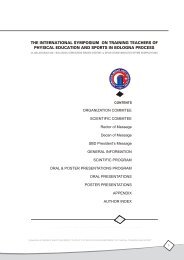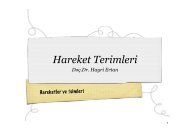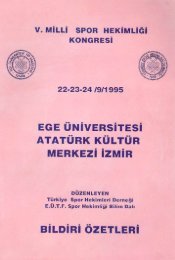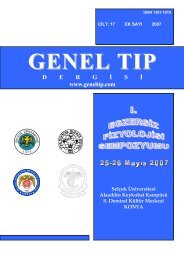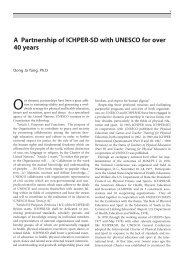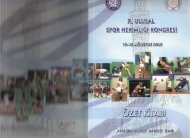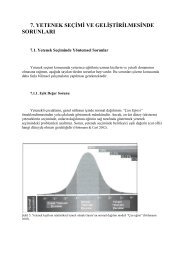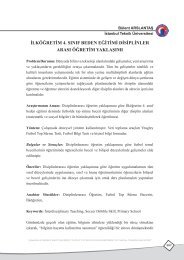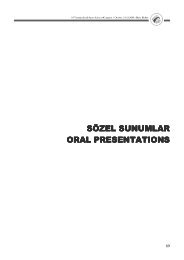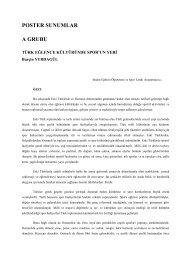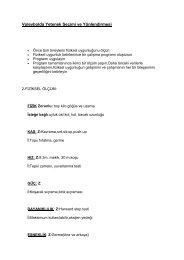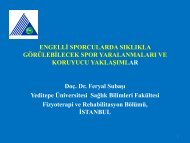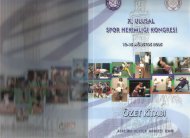KARDÄ°YORESPÄ°RATUVAR EGZERSÄ°Z TESTLERÄ° ... - Spor Bilim
KARDÄ°YORESPÄ°RATUVAR EGZERSÄ°Z TESTLERÄ° ... - Spor Bilim
KARDÄ°YORESPÄ°RATUVAR EGZERSÄ°Z TESTLERÄ° ... - Spor Bilim
You also want an ePaper? Increase the reach of your titles
YUMPU automatically turns print PDFs into web optimized ePapers that Google loves.
7.ULUSLARARASI SPOR BİLİMLERİ KONGRESİ27-29 EKİM 2002KONGRE - PANELLER5.3 On arrivalRecommendations following arrival in the new time-zone will very much depend on whether the flight hasbeen in a westerly or an easterly direction. They depend also on the time of arrival.Generally, activity is encouraged and the best practice is to fit in as early as possible with the local timekeeping.If the flight has been westward, a robust approach to fighting the feelings of tiredness is advocated inorder to maintain alertness until bedtime. Naps should be avoided at the time of feeling fatigued during the dayas such naps constitute ―anchor sleep‖, keeping the body clock to the time of the previous time-zone. Exerciseis a very good means of regaining ‗arousal‘ but training in the morning is best avoided for a few days after flyingeastward. This makes it easier to ensure the body clock is adjusted in the right direction and a lie-in isrecommended for the first couple of days. A lie-in after travelling westward is not advised.6. ConclusionThese recommendations make it clear that there is no short-cut antidote to combatting jet-lag. A sensiblebehavioural approach is advocated and by doing so jet-lag becomes a relatively minor issue for the focussedsports performer. A rule of thumb is to allow one day to adjust for each time-zone crossed. This margin willenable all players in a squad to be adapted to the new local time before a competitive engagement. Awarenessof chronobiological principles will allow the managers to make appropriate travel arrangements so that thetravelling athlete‘s performance is not necessarily impaired due to circadian desynchronisation.ReferencesArendt, J., Aldhous, M., English, J., Marks, J., Arendt, J. H., Marks, M. and Folkard, S. (1987). Some effects of jet-lag andtheir amelioration by melatonin. Ergonomics, 30, 1379-1393.Atkinson, G., Buckley, P., Edwards, B., Reilly, T. and Waterhouse, J. (2001). Are there hangover effects on physicalperformance when melatonin is ingested by athletes before nocturnal sleep? International Journal of <strong>Spor</strong>ts Medicine,22, 232-234.Cardinali, D. P., Bortman, G. P., Liotta, G., Lloret, S. P., Albornoz, L. E., Cutera, R. A., Batista, J. and Gallo P. O. (2002). Amultifactorial approach employing melatonin to accelerate resynchronisation of sleep-wake cycle after a 12 time-zonewesterly tranmeridian flight in elite soccer athletes. Journal of Pineal Research, 32, 41-46.Edwards, B. J., Atkinson, G., Waterhouse, J., Reilly, T., Godfrey, R. and Budgett, R. (2000). Use of melatonin in recoveryfrom jet-lag following an eastward flight across 10 time-zones. Ergonomics, 43, 1501-1513.Ehret, G. F. and Scanlon, L. H. (1983). Overcoming Jet-lag. Berkeley Publishing, New York.Graeber, R., Sing, H. and Cuthbert, B. (1981). The impact of transmeridian flight on deploying soldiers. In: BiologicalRhythms, Sleep and Shift-work (edited by L. Johnson, D. Tepas and P. Colquhoun), MTP Press, Lancaster, pp. 513-537.Jehue, R., Street, D. and Huizenga, R. (1993). Effect of time zone and game time changes on peak performance: NationalFootball League. Medicine and Science in <strong>Spor</strong>ts and Exercise, 25, 127-131.Leathwood, P. (1989). Circadian rhythms of plasma amino acids brain neurotransmitters and behaviour, In: BiologicalRhythms in Clinical Practice (edited by J. Arendt, D. Minors and J. Waterhouse), John Wright, Bristol, pp. 146-159.Minors, D. S. and Waterhouse, J. M. (1981). Anchor sleep as a synchroniser of abnormal routines. International Journal ofChronobiology, 7, 165-188.Minors, D., Waterhouse, J. and Wirz-Justice, A. (1991). A human phase-response curve to light. Neuroscience. Leterst,133, 36-40.Reilly, T. and Maskell, P. (1989). Effects of altering the sleep-wake cycle on human circadian rhythms and motorperformance. In: Proceedings of the First IOC Congress on <strong>Spor</strong>ts Science, Colorado Springs, pp. 106-107.352



